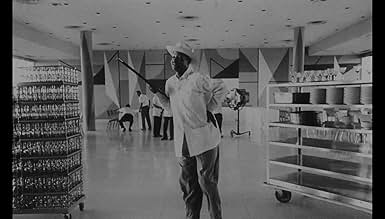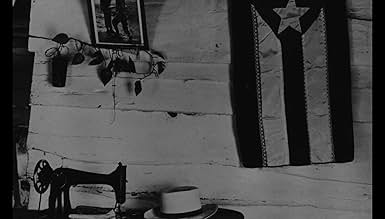Agrega una trama en tu idiomaA photo montage of Cubans filmed by Agnes Varda during her visit to Cuba in 1963. The film explores Cuban society and culture post-revolution.A photo montage of Cubans filmed by Agnes Varda during her visit to Cuba in 1963. The film explores Cuban society and culture post-revolution.A photo montage of Cubans filmed by Agnes Varda during her visit to Cuba in 1963. The film explores Cuban society and culture post-revolution.
Tomás Gutiérrez Alea
- Self
- (as T.G. Alea)
Argumento
¿Sabías que…?
- TriviaThe documentary consists of a montage of photographs that Agnès Varda took on a trip to Cuba.
- ConexionesEdited into Cinévardaphoto (2004)
Opinión destacada
I had saved this for a time when I might want to vicariously visit Cuba. Fidel Castro passed away last week so it felt like an occasion on which to look back and reflect. The place is seductive and the guide would not be just anyone. Chris Marker had been there two years before but Varda is second to none in my book.
Agnes is reflecting on her own right here. It's not meant to be a chronicle of anything, much less paean of revolution, but a sketchbook of impressions, glimpses on the road. She had been there and came back with still images which she edits in a playful way. The revolution does loom central of course, in the campaigns to literate peasants and the collective dances of gathering sugarcane, the frescoes and images of heroes, but seen through Varda's eyes, Cuba is a place that above all sways in rhythms and music that well up from inside of it, from generosity of heart. It is collective joy that Varda graces us with and salutes.
It's in the music, the religious dances and masks, the sugarcane work, the women's bodies, such evocative women that even Varda pauses to admire. It's no less in the gallery of gruesome photos from the war, exhibits of pride. Another segment admires soldiers on horseback as movie figures from westerns, ironically admiring the capacity of image to support our own imprints of meaning, able to bridge odd divides. Fidel as the Gary Cooper of the revolution, the narrator muses.
It all turns around form, image, dances of recollection from these, the transient and impromptu. It all points to how the image is pliant, a field where memories and narratives intersect. Some of these she has just improvised for us.
I don't leave feeling like I'm much the wiser about Cuba or revolution, which is okay, I'm fine without being wise in that sense. I leave feeling like I have briefly swayed in the breeze of being able to touch without smudging, partake without taking, know without knowing. More important this.
Agnes is reflecting on her own right here. It's not meant to be a chronicle of anything, much less paean of revolution, but a sketchbook of impressions, glimpses on the road. She had been there and came back with still images which she edits in a playful way. The revolution does loom central of course, in the campaigns to literate peasants and the collective dances of gathering sugarcane, the frescoes and images of heroes, but seen through Varda's eyes, Cuba is a place that above all sways in rhythms and music that well up from inside of it, from generosity of heart. It is collective joy that Varda graces us with and salutes.
It's in the music, the religious dances and masks, the sugarcane work, the women's bodies, such evocative women that even Varda pauses to admire. It's no less in the gallery of gruesome photos from the war, exhibits of pride. Another segment admires soldiers on horseback as movie figures from westerns, ironically admiring the capacity of image to support our own imprints of meaning, able to bridge odd divides. Fidel as the Gary Cooper of the revolution, the narrator muses.
It all turns around form, image, dances of recollection from these, the transient and impromptu. It all points to how the image is pliant, a field where memories and narratives intersect. Some of these she has just improvised for us.
I don't leave feeling like I'm much the wiser about Cuba or revolution, which is okay, I'm fine without being wise in that sense. I leave feeling like I have briefly swayed in the breeze of being able to touch without smudging, partake without taking, know without knowing. More important this.
- chaos-rampant
- 10 dic 2016
- Enlace permanente
Selecciones populares
Inicia sesión para calificar y agrega a la lista de videos para obtener recomendaciones personalizadas
Detalles
- Tiempo de ejecución30 minutos
- Color
- Mezcla de sonido
- Relación de aspecto
- 1.66 : 1
Contribuir a esta página
Sugiere una edición o agrega el contenido que falta

Principales brechas de datos
By what name was Salut les Cubains (1963) officially released in Canada in English?
Responda




















